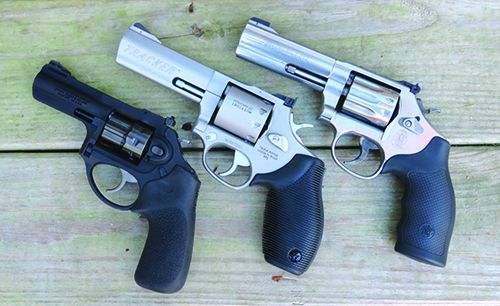When it comes to choosing a revolver, accuracy is likely at the top of your mind. You want a firearm that hits the target precisely, whether for self-defense, sport, or practice.
But how accurate are double-action revolvers really? You might have heard mixed opinions or wondered if the double-action mechanism affects your shot. You’ll discover the truth behind their accuracy and what factors play the biggest role. By the end, you’ll have the confidence to decide if a double-action revolver fits your needs—and how to get the most out of it.
Keep reading to unlock the secrets that can improve your aim and performance.

Double-action Revolver Mechanics
Double-action revolvers operate with a unique mechanism. This design allows the shooter to fire the gun by simply pulling the trigger. The trigger pull both cocks the hammer and releases it, firing the bullet.
This process differs from single-action revolvers, where the hammer must be manually cocked. The double-action system offers faster shooting but can affect how steady the shot is.
Trigger Pull Dynamics
The trigger pull in double-action revolvers is longer and heavier. It requires more force to pull the trigger all the way back. This extra effort can cause the shooter’s hand to move slightly.
Movement during trigger pull can make it harder to keep the sights steady on the target. The weight and length of the pull vary between different models and brands. Some double-action revolvers have smoother pulls, making them easier to control.
Impact On Accuracy
The heavier trigger pull can reduce accuracy, especially for new shooters. The hand movement may shift the aim before the bullet fires. Experienced shooters learn to manage this and improve their precision.
Despite the challenge, many double-action revolvers shoot accurately at close to medium ranges. The design allows for quick follow-up shots, which can be useful in defensive situations.

Factors Affecting Accuracy
Accuracy of double-action revolvers depends on several important factors. Each factor plays a role in how well the gun shoots. Understanding these can help improve shooting results and expectations.
Barrel Length And Quality
Barrel length affects bullet speed and stability. Longer barrels often give better accuracy due to higher velocity. The barrel’s quality also matters. A well-made barrel with smooth rifling guides the bullet steadily. Poor barrel craftsmanship can cause bullets to stray off target.
Ammunition Types
Ammunition impacts how the revolver performs. Different bullet weights and powders change recoil and flight path. Some ammo types suit double-action revolvers better. Using consistent, quality ammunition helps maintain steady accuracy.
Shooter Skill Level
The shooter’s skill greatly influences accuracy. Proper grip, stance, and trigger control matter most. Double-action trigger pulls are longer and heavier. This requires more practice to shoot accurately. Experienced shooters can better manage these challenges and hit targets reliably.
Comparing Single-action And Double-action
Single-action and double-action revolvers differ mainly in how the trigger operates. This difference affects shooting style and accuracy. Understanding these variations helps shooters choose the right revolver for their needs.
Single-action revolvers require the shooter to manually cock the hammer before each shot. This action makes the trigger pull lighter and shorter. Double-action revolvers allow the shooter to pull the trigger to both cock and release the hammer in one motion. This makes the trigger pull longer and heavier.
Trigger Control Differences
Single-action triggers have a crisp and light pull. This allows for smooth and precise trigger control. Double-action triggers are heavier and longer. This can make it harder to keep the gun steady while firing. Good trigger control is easier with single-action revolvers. Double-action requires more practice to manage the heavier pull.
Precision And Consistency
Single-action revolvers usually offer better precision. The light trigger pull reduces movement that can throw off aim. Consistency in shot placement is easier to maintain with single-action models. Double-action revolvers may sacrifice some precision due to the heavier trigger. Consistent shooting with double-action demands strong finger control and steady hands.
Common Misconceptions
Many people believe double-action revolvers lack accuracy. These ideas come from old stories and some outdated tests. Understanding the truth helps shooters trust their weapons and improve skills.
Myths About Double-action Accuracy
Some think double-action triggers are too heavy for precise shots. The longer, harder pull might cause the gun to move off target. Others say double-action revolvers cannot match semi-automatic pistols in accuracy. A common myth is that double-action mode always reduces control and speed.
These beliefs ignore the shooter’s training and the gun’s design. Modern double-action revolvers have smoother triggers and better balance. Many shooters find they can shoot accurately with practice. The trigger weight alone does not decide accuracy.
Real-world Performance
In real life, double-action revolvers perform well for many tasks. Police and self-defense users rely on them for quick, accurate shots. The double-action mode allows for faster shooting without cocking the hammer first. Skilled shooters can place rounds precisely, even under pressure.
Testing shows that double-action revolvers can group shots tightly at common distances. Proper grip, stance, and trigger control matter more than the action type. These guns offer reliable accuracy and simplicity for users of all levels.
Testing And Performance Results
Testing and performance results give clear insight into double-action revolvers’ accuracy. Practical tests show how these guns perform in real shooting conditions. They help understand the true precision and reliability of double-action revolvers.
Range Test Data
Range tests measure how close shots land to the target center. Double-action revolvers often show good accuracy at short to medium distances. Group sizes typically fall between 2 and 4 inches at 25 yards. Trigger pull weight affects shot consistency. Heavy triggers may reduce precision for some shooters. Lighter triggers tend to improve grouping. Ammunition type also plays a key role in accuracy. Consistent ammo yields tighter shot groups. Overall, range data confirms double-action revolvers perform well under controlled conditions.
Expert Reviews
Experts praise double-action revolvers for durability and ease of use. They note that accuracy depends on shooter skill and trigger control. Many professionals say double-action mode is less precise than single-action mode. Still, well-made models deliver reliable accuracy suitable for self-defense. Experts recommend regular practice to improve performance. They highlight the importance of proper grip and sight alignment. Reviews often mention that revolvers are forgiving with recoil. This helps maintain accuracy during rapid fire. Expert feedback supports range test findings and practical shooting experience.

Tips To Improve Double-action Accuracy
Improving accuracy with double-action revolvers takes focus and the right approach. Small changes in how you train and what gear you use can make a big difference. Below are simple tips to help you shoot better and hit your target more often.
Practice Techniques
Start with slow, steady shots to build control. Focus on your grip and trigger pull. Pull the trigger evenly without jerking. Dry firing at home helps improve muscle memory without wasting ammo. Practice at different distances to adjust your aim. Use a consistent stance to stay balanced. Take breaks to avoid fatigue and maintain focus.
Equipment Upgrades
Choose grips that fit your hand well for better control. Consider lighter trigger pulls if possible. A smooth trigger helps reduce movement when shooting. Add sights that are clear and easy to see. Fiber optic or adjustable sights can improve aiming. Regular cleaning keeps your revolver working smoothly. Well-maintained parts reduce misfires and improve accuracy.
Frequently Asked Questions
How Accurate Are Double-action Revolvers Compared To Single-action?
Double-action revolvers are generally less accurate than single-action due to a heavier trigger pull. However, skilled shooters can achieve good precision with practice and proper technique.
What Factors Influence Double-action Revolver Accuracy?
Accuracy depends on barrel length, trigger pull weight, ammunition quality, and shooter skill. Longer barrels usually improve precision, while lighter trigger pulls reduce shot disturbance.
Can Double-action Revolvers Be Used For Target Shooting?
Yes, double-action revolvers can be used for target shooting. Consistent practice, quality ammunition, and proper sight alignment help maximize accuracy.
Does Barrel Length Affect Double-action Revolver Accuracy?
Yes, longer barrels provide a longer sight radius and better bullet velocity, improving accuracy. Short-barreled revolvers are easier to carry but less precise.
Conclusion
Double-action revolvers offer good accuracy for many shooters. Their design allows for quick shooting but may affect precision. Practice helps improve aim and control. Understanding your revolver’s trigger pull is key. Aim steady and focus on the target each time.
These guns work well for self-defense and casual shooting. Accuracy depends on the shooter’s skill and the firearm’s quality. Try different models to find what suits you best. Keep training to build confidence and accuracy. Shooting well takes time, patience, and steady hands.

